|
|
|
Sort Order |
|
|
|
Items / Page
|
|
|
|
|
|
|
| Srl | Item |
| 1 |
ID:
134079
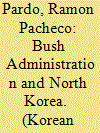

|
|
|
|
|
| Publication |
2014.
|
| Summary/Abstract |
Why did the George W. Bush Administration change its policy toward North Korea from confrontation to accommodation during the second nuclear crisis? This article answers the question by analyzing how and why a coalition-including Bush Administration doves, China, Russia, South Korea and, at times, Japan and North Korea-worked together to overcome the reticence of Bush Administration hawks to engage with Pyongyang. Building on the soft balancing, bureaucratic politics, and transgovernmental coalitions literature, this article explains how the Six-Party Talks served this coalition to understand the extent to which they shared goals and policies. Aware of the divisions within the Bush Administration regarding policy toward North Korea, the five other parties to the talks were able to undermine the preferred policies of U.S. hawks while supporting the policies of doves. Thus, rather than determining Washington's behavior, this coalition laid the ground for U.S. officials supportive of accommodation to upload their preferences into official Bush Administration's policy. This article therefore also sheds light on how soft balancing can be used by third parties to influence the decision-making process in the United States.
|
|
|
|
|
|
|
|
|
|
|
|
|
|
|
|
| 2 |
ID:
158010
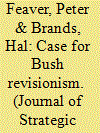

|
|
|
|
|
| Summary/Abstract |
This article reassesses the foreign policy legacy of George W. Bush in light of the emerging historical record of his administration. We conclude that, whereas Bush’s foreign policy was in widespread disrepute when he left office in 2009, that reputation is likely to improve – perhaps significantly – in the coming years. We identify six particular arguments that lend credence to an emerging ‘Bush revisionism.’ To be clear, we do not necessarily argue that the balance sheet on Bush’s foreign policy was positive, but the arguments presented here are likely to generate a more sympathetic and favorable historical assessment of Bush’s presidency over time.
|
|
|
|
|
|
|
|
|
|
|
|
|
|
|
|
| 3 |
ID:
145618
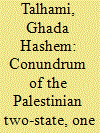

|
|
|
|
|
| Summary/Abstract |
This study seeks to explain the implications of the US's withdrawal from the Israeli-Palestinian peace negotiations, resulting in the weakening of the Palestinian Authority, and calls for abrogating the Oslo Accords. Causes of the failure of the Accords, such as the Palestinians' inability to act on Oslo's projected date of 1990 for statehood, or to stand up to the Clinton Parameters for peace, or to stem the tide of the Jewish settlement movement, or to capitalize on pronouncements of the International Criminal Court on the Wall and the settlements, are examined. International stalemate resulting from Israel's freezing of the Quartet's Roadmap leading to Israel's rebranding itself as a Jewish state hammered the last nail in the coffin of the two-state solution. The article concludes with an assessment of Israeli reaction to the one-state solution.
|
|
|
|
|
|
|
|
|
|
|
|
|
|
|
|
| 4 |
ID:
090652
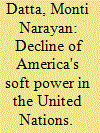

|
|
|
|
|
| Publication |
2009.
|
| Summary/Abstract |
To what extent does anti-Americanism precipitate a decline in America's soft power? Nye postulates a negative relationship, presenting substantial implications for the U.S. national interest. In this paper, I test Nye's hypothesis through an examination of America's political influence within the United Nations. Using a fixed effects model, I regress voting alignment within the UN General Assembly (UNGA) on cross-national, aggregate public opinion toward the United States from 1985 to 2007. Controlling for foreign aid received and alliances with the United States, I find a statistically significant, positive relationship between favorable attitudes toward the United States and voting alignment within the UNGA on overall plenary votes and those votes for which the U.S. lobbies other UN-member states extensively. At the same time, controlling for temporal effects, states are far less supportive of U.S. interests in the UN throughout the tenure of President George W. Bush, capturing the effect of "anti-Bushism" in addition to anti-Americanism. The results of this study shed light on an emerging area of the literature that not only studies the sources of anti-Americanism, but also its consequences.
|
|
|
|
|
|
|
|
|
|
|
|
|
|
|
|
| 5 |
ID:
082929


|
|
|
|
|
| Publication |
2008.
|
| Summary/Abstract |
Is the United States inevitably in decline? After the foreign policy controversies of the George W. Bush years, a new consensus declares the end of American dominion. In this article this conventional wisdom is challenged. The US constitutes an 'exceptional empire' and, despite the recent rise of powers such as the EU, China and India, the four foundations of this distinctive empire remain robust. First, the US still exhibits global predominance in hard power. Second, the essentially unipolar international order shaped by Washington remains resilient. Third, neither the rise of 'anti-Americanism' nor the alleged decline of US 'soft power' endanger its predominance. Fourth, the US political class is committed to preserving American primacy after Bush. No other power is currently in range of competing with the US for global influence. Moreover, each faces powerful internal weaknesses and external threats at least as significant as those facing the US. America's global predominance in hard and soft power do not translate into omnipotence. Nor does predominance promise an error-free foreign policy. The US nonetheless continues to defy both history and theory
|
|
|
|
|
|
|
|
|
|
|
|
|
|
|
|
| 6 |
ID:
089958


|
|
|
|
|
| Publication |
2009.
|
| Summary/Abstract |
After September 11, 2001, President George W. Bush's administration presented a national security agenda that held two key goals: the denial of safe havens to terrorist groups with international reach, and the prevention of terrorist groups from acquiring Weapons of Mass Destruction (WMD). In 2002, a terrorist group, Ansar al-Islam, operating out of a camp in Khurmal, northeast Iraq, was reportedly developing cyanide gas, toxic poisons, and ricin for potential use against Europe and the United States. The Joint Chiefs of Staff unanimously supported, and formally presented to the White House, a military operation to destroy the Ansar camp. This article, based on research and interviews with senior military and civilian officials, assesses four plausible explanations for why President Bush deferred attacking the only place in Iraq that was producing WMD, albeit in small quantities, before the 2003 war. It argues that President Bush made the mistake of bypassing the Khurmal operation, because of concerns that it could have disrupted plans to remove Saddam Hussein from power. In addition, the article assesses what lessons learned from the decision not to attack Khurmal could be applied to other non-uses of limited force.
|
|
|
|
|
|
|
|
|
|
|
|
|
|
|
|
| 7 |
ID:
078487


|
|
|
|
|
| Publication |
2007.
|
| Summary/Abstract |
What will be the legacy that President George W. Bush bequeaths to his successor in the fields of global trade and finance? In answering this question, the article will analyse the three most crucial international economic issues that the Bush administration has faced during its two terms in office. First, Bush's policy of trade liberalization will be considered. While the United States has negotiated a significant number of new bilateral and regional trade agreements over the past 7 years, global trade talks remain deadlocked. With increasing protectionist sentiment in evidence in Congress, Bush is unlikely to conclude the Doha Development Round by the time he leaves office in 2009. Second, global trade imbalances partly caused by the US current account deficit threaten the stability of international financial markets and global prosperity. The article concludes that the US has pursued a policy of 'begin neglect' towards the problem and needs to act more proactively to prevent a hard landing for the American and world economies. Finally, the economic relationship between the US and China is examined. The article argues that the United States needs to continue to engage China in the interests of global economic growth and regional stability in Southeast Asia while avoiding a trade conflict
|
|
|
|
|
|
|
|
|
|
|
|
|
|
|
|
| 8 |
ID:
153009


|
|
|
|
|
| Summary/Abstract |
Traditionally seen as a President consumed by the war on terror, George W. Bush is frequently portrayed as being relatively uninterested in Asia, and unable to outline a vision or a strategy to China, America’s Asian allies and Asian multilateral mechanisms. This article will revisit Bush’s policy on Asia and show a president who guided the United States with a policy that balanced the need to combat global terrorism and locate a focus on Asia. He faced the dilemmas of building cooperative relations with a rising China while trying to foster American alliances and partnerships in Asia, and managing the wars in Afghanistan and Iraq. Utilizing qualitative content analysis as the main research method, the article will demonstrate that the Bush administration had not a lack of focus on Asia and that Bush’s diplomacy to Asia should be recognized as one of the most significant achievements of his presidency.
|
|
|
|
|
|
|
|
|
|
|
|
|
|
|
|
| 9 |
ID:
078644
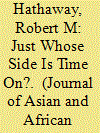

|
|
|
|
|
| Publication |
2007.
|
| Summary/Abstract |
President Bush's bold National Security Strategy document of September 2002 would appear to have been written with North Korea as much as Iraq in mind. Yet the Bush administration has been uncharacteristically passive in responding to the challenge posed by Pyongyang's nuclear weapons ambitions, especially in comparison with the forceful manner with which the administration dealt with Iraq. In the latter case, Bush mobilized the full weight of military force; seemed disdainful of allies, international institutions and multilateral diplomacy; and moved forward with what his critics deemed reckless abandon. In the case of North Korea, on the other hand, the President has emphasized patience, close coordination with allies and an overall lack of urgency oddly at variance with his `axis of evil' characterization of the regime in Pyongyang, and with dangerous advances in North Korea's nuclear arsenal. This essay attempts to explain the rationale behind the Bush administration's surprisingly relaxed approach to the North Korea challenge
|
|
|
|
|
|
|
|
|
|
|
|
|
|
|
|
| 10 |
ID:
091960
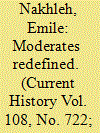

|
|
|
|
|
| Publication |
2009.
|
| Summary/Abstract |
Political Islam has been part of the modern Middle East landscape for several decades, but until recently the United States has rarely perceived a need to engage it. After the attacks against New York and Washington on September 11, 2001, the administration of George W. Bush painted political Islam in the Middle East, as in the rest of the Muslim world, with the broad brush of terrorism.
|
|
|
|
|
|
|
|
|
|
|
|
|
|
|
|
| 11 |
ID:
077465
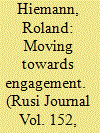

|
|
|
|
|
| Publication |
2007.
|
| Summary/Abstract |
Curbing North Korea's development of nuclear weapons has long been one of the main challenges for US foreign policy. The approach of the Bush Administration has been grounded in a preference for a confrontational posture. Recently, US policy has undergone a significant change in dealing with the DPRK. Washington has endorsed a policy it once dismissed at best as counterproductive and at worst as appeasement: engaging the North Korean regime. This article seeks to explain the Administration's newfound flexibility toward the DPRK. It reflects on recent changes in both the international strategic and the US domestic political environments that have likely driven the Administration to revoke its hard-line stance
|
|
|
|
|
|
|
|
|
|
|
|
|
|
|
|
| 12 |
ID:
161067


|
|
|
|
|
| Summary/Abstract |
IT HAS BEEN over a year since President Donald Trump announced on June 1, 2017 that the United States was withdrawing from the United Nations Paris Agreement on climate change. He thereby put an end to the suspense that had lasted right from the U.S. presidential election and was on a par with a good thriller. Though the Republican election platform included a point to remove the U.S. signature from under the accord and Trump had repeatedly confirmed it, the global environmentalist lobby had constantly kept world public opinion agitated by speculations in the media.
|
|
|
|
|
|
|
|
|
|
|
|
|
|
|
|
| 13 |
ID:
092050
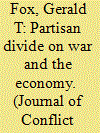

|
|
|
|
|
| Publication |
2009.
|
| Summary/Abstract |
This study examines the influence of 9/11, the Iraq War, the economy, and the coalition-of-minorities on presidential approval of G. W. Bush across partisan subgroups and aggregate popularity. The analysis considers the effect of underlying partisan preferences on overall approval. A partisan divide occurs for war and the economy on Bush popularity. The events of 9/11 and the Iraq War affect Democratic opinions of Bush more than Republican opinions, whereas the economy impacts Republicans more than Democrats. An in-party/out-party rally effect occurs. Democrats show stronger rallies than Republicans for 9/11 and the Iraq War, but also faster and deeper popularity decay of the rallies. All economic and war-related effects significantly influence Independents and aggregate Bush popularity. The coalition-of-minorities pattern of declining presidential approval is caused by the 9/11 rally decay effect, the war casualties effect, and the slowing economy during Bush's second term in office.
|
|
|
|
|
|
|
|
|
|
|
|
|
|
|
|
| 14 |
ID:
149501


|
|
|
|
|
| Summary/Abstract |
KEVIN EVANS and BRYAN MARSHALL analyze “signing statements” from John F. Kennedy to George W. Bush and find that presidents are more likely to give credit to members of Congress for legislative accomplishments when political conditions make bill passage difficult. They show that presidents strategically share credit with key coalition members, party leaders, co-partisans, and senators in order to support their coalition and party-building needs in Congress.
|
|
|
|
|
|
|
|
|
|
|
|
|
|
|
|
| 15 |
ID:
089341


|
|
|
|
|
| Publication |
2009.
|
| Summary/Abstract |
Emily Jane Charnock, James A. McCann, and Kathryn Dunn Tenpas examine patterns of presidential travel since the Eisenhower years, focusing on the factors that prompt visits to particular states during the first term. The authors argue that electoral considerations are becoming increasingly relevant as presidents decide where and when to travel.
|
|
|
|
|
|
|
|
|
|
|
|
|
|
|
|
| 16 |
ID:
084027
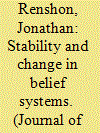

|
|
|
|
|
| Publication |
2008.
|
| Summary/Abstract |
Cognitive frameworks and belief systems are the primary lenses through which presidents view the world. Two important questions are whether these beliefs ever change significantly, and if so, what causes these changes? This article develops empirical data on the strategic and operational beliefs of President George W. Bush (GWB) as a means of examining the theoretical basis for how and why core beliefs change. The author analyzes the foreign policy operational code of President Bush in four separate phases of his political career: the immediate prepresidential phase; his nine months in office prior to September 11, 2001; the six months immediately following the 9/11 terrorist attacks; and his last year in office as a second-term president. The results of this article allow us to address several recurring questions that concern the Bush administration and presidents' belief systems and decision making. They challenge traditional interpretations of the Bush presidency and provide some insights into the causal mechanisms that underlie belief change.
|
|
|
|
|
|
|
|
|
|
|
|
|
|
|
|
|
|
|
|
|